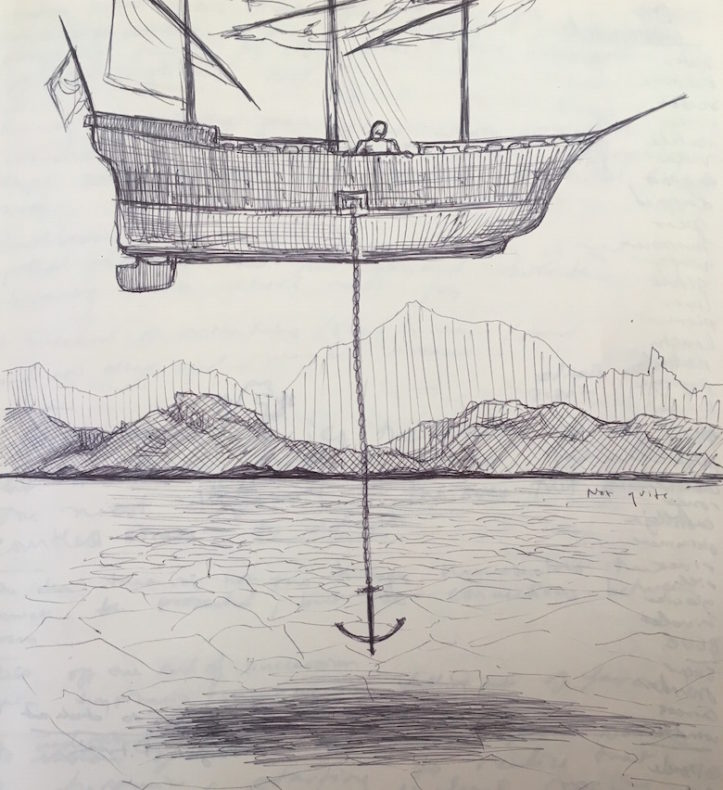
This post originally appeared January 12, 2017
Perhaps 500 yards from my door—up an icy, winding driveway, a short way down a gravel road, beyond barbed wire fences and snow-skirffed pastures and the wind-twisted trunks of piñon and juniper trees—is a barn that shelters two sailboats in the middle of the Colorado desert. I first spotted them on a walk and stopped to stare. The nearest large reservoir is more than two hours away from the house I am borrowing here; the ocean, more than 16 hours away.
But as freezing gusts combed fingers through my hair, grasped and numbed my hands, the sailboats began to make a certain sense. This desert breaks in waves to the horizons like an ocean, troughed with canyons, crested with rimrock and foamed with sage and rabbitbrush. And since I arrived two weeks ago, its surface has been slapped by just the kind of steady wind that would make those sailboats fly across water. Perhaps, I thought, they’re waiting for their moment to take wing through the air, instead.
I came to western Colorado for a brief stint of solitude, quiet, and space after a hectic three months. My home in Portland, Oregon, borders a busy thoroughfare. Cars grind by day and night. Drunk people yell from sidewalk corners. There is no escaping the glare of streetlights. When I’m anxious – as I have often been with recent writing projects and the turmoil that’s followed the presidential election – I can’t sleep until I stuff my head under a stack of pillows, simulating the peaceful, pitch-black rural nights that were the norm in my adult life before I moved to the city.
And yet while the desert has delivered more space than I know what to do with, the quiet and solitude I hoped for have been hard to come by. Because the same wind that clutches at my hair and clothes on my walks is always dropping by the house to visit. It shows up at the door as it pleases. Creeps around the eaves. Rattles windows. Hurls loose boxes. Tears sapling logs from the awning over the porch and slams them onto the picnic table. Wildly shifts in mood from snow to rain to sun and back again. It sneaks beneath doorjambs, and rushes through the woodstove flue, burning the fire out quick and hot, stealing the warmth from the house little by little. And when I try to go to bed, it refuses to leave, shrieking and carrying on louder than any drunk person staggering out of a Portland bar.
Out here, it’s not so hard to see why the lore of the American West is rent through with tales of remote homesteaders driven mad by wind. “…(It) sprang up afresh, with a kind of bitter song,” wrote Willa Cather in My Antonia, “as if it said: ‘This is reality, whether you like it or not. All those frivolities of summer, the light and shadow, the living mask of green that trembled over everything, they were lies, and this is what was underneath. This is the truth.’”
That unintelligible voice is lonely, longing, insistent. More haunted than ghosts, coming, as it does, from beyond the borders of individual lifespans, the margins that contain the beginnings and end of breath. I’ve found myself pacing the house, scolding the wind when it drowns out my podcasts, or whispering it away when it invades my dreams. Drawn out the door one restless night to stand under a sky scraped with fast-moving clouds, I half expected to find the sailboats drifting overhead, straining at their anchors in the current of weather roaring toward the mountains.
As I blinked up at the few visible pin-bright stars, though, that vision felt less like madness and more like a gift: Something buoyant to carry me and mine through the troubled years ahead. So tonight, as the wind scours its way up the canyon and along the mesa toward the house, I will light my oil lamps and set an extra place at the table. Then, I will crack the door and invite it inside. I get the feeling it has much to tell me, if I finally listen.
Original artwork by the author.